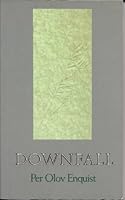Description
Midway through this carefully crafted, often terrifying piece of experimental literature by one of Sweden's best-known authors, he digresses on the subject of monsters. Modern medicine has made them invisible, he says, but they've just gone to earthinside us. This, the reader realizes, is the book's premise. The narrator lays before us several stories, interspersed with his own reflective commentary. K, a psychiatrist, befriends the murderer of his daughter, an adolescent who has killed before, just as randomly. Institutionalized, the boy begs K to help him commit suicide. In another tale, Pasqual Pinon, a freak show attraction, has a female head sprouting from his own, complete in every respect except for a voice. They communicate telepathically, expressing disgust, hatred and, finally, toward the end of their life (lives?), love. This illuminates another of Enquist's obsessionsdocumenting the way we each privately choose to confront death. The lyrical, repetitive imagery, the sadomasochistic streak running throughoutthis is a celebration of death, not lifemakes this an edgy, often brilliant piece of writing. (May)


 Amazon UK
Amazon UK